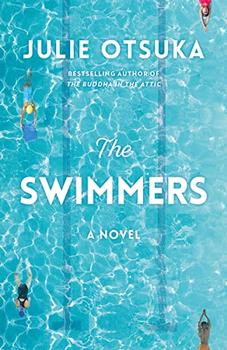Summary | Excerpt | Reviews | Beyond the Book | Readalikes | Genres & Themes | Author Bio

A novel
by Julie Otsuka
IN OUR "REAL LIVES" up above, we are overeaters, underachievers, dog walkers, cross-dressers, compulsive knitters (Just one more row), secret hoarders, minor poets, trailing spouses, twins, vegans, "Mom," a second-rate fashion designer, an undocumented immigrant, a nun, a Dane, a cop, an actor who just plays a cop on TV ("Officer Mahoney"), a winner of the green card lottery, a two-time nominee for Outstanding Professor of the Year, a nationally ranked go player, three guys named George (George the podiatrist, George the nephew of the disgraced financier, George the former welterweight Golden Gloves boxer), two Roses (Rose, and the Other Rose), one Ida, one Alice, one self-described nobody (Don't mind me), one former member of the SDS, two convicted felons, addicted, enabled, embattled, embittered, out of print, out of luck (I think I just seroconverted), in the twilight of lackluster real estate careers, in the middle of long and protracted divorces (It's year seven), infertile, in our prime, in a rut, in a rush, in remission, in the third week of chemo, in deep and unrelenting emotional despair (You never get used to it), but down below, at the pool, we are only one of three things: fast-lane people, medium-lane people or the slow.
THE FAST LANE PEOPLE are the alpha people of the pool. They are high-strung and aggressive and supremely confident in their stroke. They look excellent in their swimsuits. Anatomically, they tend to be mesomorphs who carry an extra pound or two of fat for enhanced flotation. They have broad shoulders and long torsos and are equally divided between women and men. Whenever they kick, the water churns and boils. It is best to stay out of their way. They are natural-born athletes blessed with both rhythm and speed and have an uncanny feel for the water that the rest of us lack.
THE MEDIUM-LANE PEOPLE are visibly more relaxed than their fast-lane brethren. They come in all sizes and shapes and have long ago given up any dreams they may have once harbored of swimming in a faster and better lane. No matter how hard they try, it's not going to happen, and they know it. Every once in a while, however, one of them will succumb to a bout of furious kicking, a sudden and involuntary windmilling of the arms and legs as though they thought, for a moment, that they could somehow defy their fate. But the moment never lasts for long. Legs soon tire out, strokes shorten, elbows droop, lungs begin to ache, and after a length or two they return to their normal everyday pace. That's just the way it is, they say to themselves. And then amiably, affably—Just pulling your leg, guys!—they swim on.
THE SLOW-LANE PEOPLE tend to be older men who have recently retired, women over the age of forty-nine, water walkers, aqua joggers, visiting economists from landlocked emerging third-world countries where, we have heard, they are only just now learning how to swim (It's the same with their driving), and the occasional patient in rehab. Be kind to them. Make no assumptions. There are many reasons they might be here: arthritis, sciatica, insomnia, a brand-new titanium hip, aching feet worn out from a lifetime of pounding on dry land. "My mother told me never to wear high heels!" The pool is their sanctuary, their refuge, the one place on earth they can go to escape from their pain, for it is only down below, in the waters, that their symptoms begin to abate. The moment I see that painted black line I feel fine.
Excerpted from The Swimmers by Julie Otsuka. Copyright © 2022 by Julie Otsuka. All rights reserved. No part of this excerpt may be reproduced or reprinted without permission in writing from the publisher.
Your guide toexceptional books
BookBrowse seeks out and recommends the best in contemporary fiction and nonfiction—books that not only engage and entertain but also deepen our understanding of ourselves and the world around us.